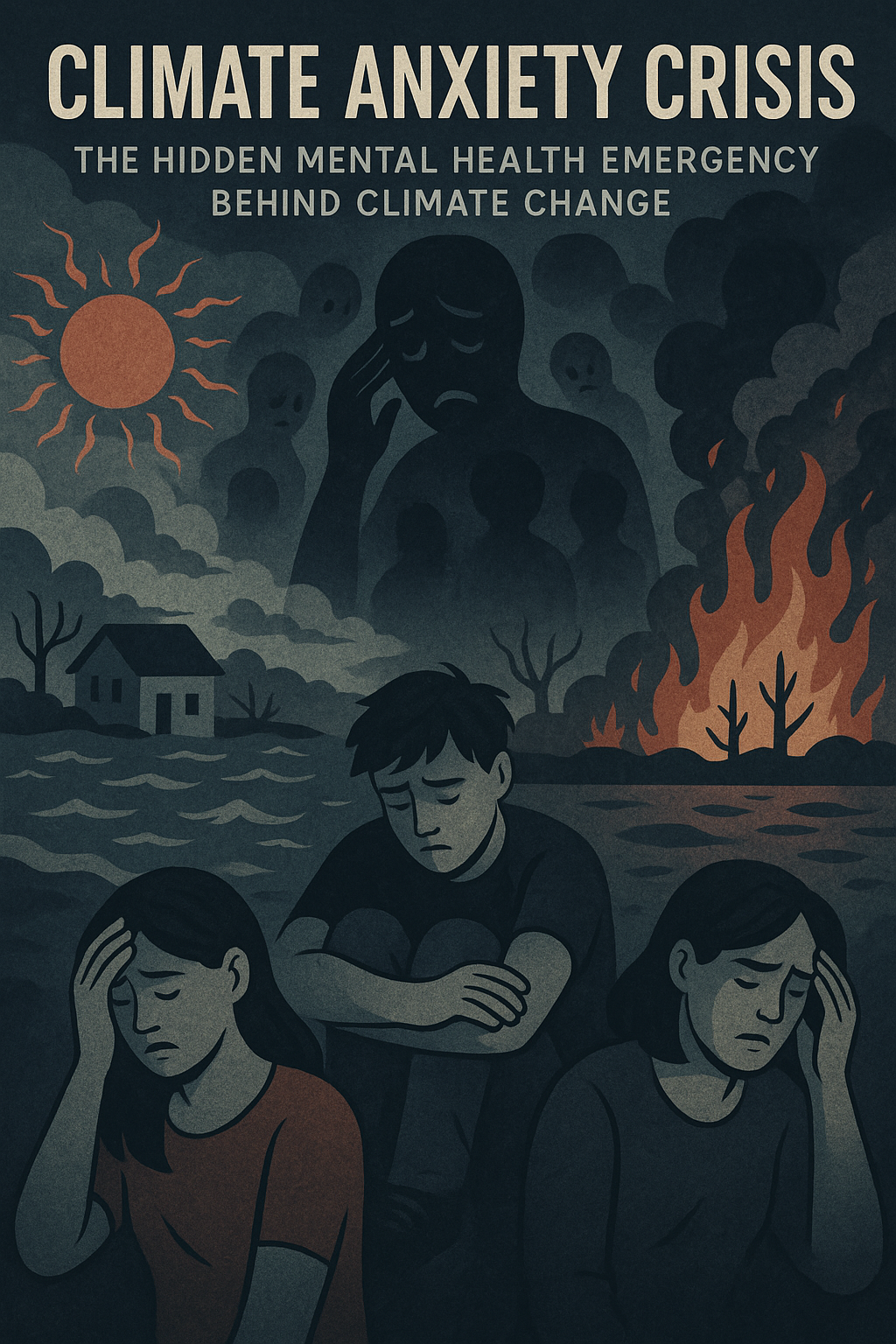Why Climate Anxiety Is the Real Mental Health Crisis We're Overlooking

Climate Anxiety Crisis: The Hidden Mental Health Emergency Behind Climate Change
Climate anxiety is no longer just a fringe concern or a passing worry-it has become a profound mental health crisis intertwined with the global climate emergency. While the mainstream conversation on climate justice rightly focuses on social equity, environmental policy, and systemic reform, it often misses the emotional and psychological toll climate change is inflicting on millions worldwide. This article challenges the dominant narrative by revealing that climate anxiety is not a side effect but a core crisis demanding urgent attention from mental health professionals, policymakers, and society at large.
If we continue to overlook the psychological impact of climate change, we risk alienating vulnerable populations, deepening despair, and undermining collective climate action. It’s time to shift the spotlight and recognize climate anxiety as a legitimate, widespread, and urgent mental health issue that shapes how people experience and respond to the climate crisis.
What Is Climate Anxiety? Understanding the Emotional Impact of Climate Change

Climate anxiety, also known as eco-anxiety or environmental anxiety, refers to the persistent and often overwhelming worry, fear, and distress about the current and future impacts of climate change. Unlike general anxiety, climate anxiety is directly linked to environmental concerns, including extreme weather events, rising sea levels, biodiversity loss, and the uncertainty of a livable future.
According to recent studies, more than two-thirds of adults report experiencing some form of climate-related stress or anxiety, with young people disproportionately affected. For example, surveys reveal that nearly 60% of youth aged 16-25 feel very or extremely worried about climate change, and many report that these feelings interfere with their daily lives and mental well-being.
Common Symptoms of Climate Anxiety Include:
-
Persistent worry and rumination about environmental disasters
-
Feelings of grief, loss, and helplessness (sometimes called ecological grief)
-
Sleep disturbances and concentration difficulties
-
Emotional exhaustion, anger, and hopelessness
-
Avoidance behaviors or emotional paralysis
This emotional burden is not abstract; it affects real people’s mental health, productivity, and social engagement.
Why the Mainstream Climate Justice Narrative Falls Short
The widely accepted climate justice framework focuses on addressing systemic inequalities, advocating for marginalized communities, and pushing for political and economic reforms. While these goals are crucial, this focus often:
-
Neglects the individual psychological toll of climate change, leaving many suffering in silence
-
Underestimates the complexity of emotional responses that climate anxiety triggers, which are rational and deeply felt
-
Fails to provide effective coping strategies tailored to climate anxiety’s unique nature, which differs from other anxiety disorders
-
Risks political disengagement by framing climate change solely as a policy issue, ignoring how emotional distress influences activism
In short, the mainstream narrative is incomplete. It overlooks the urgent need to address the mental health crisis that climate anxiety represents.
The Science Behind Climate Anxiety: Why It’s More Than Just Worry
Research shows that climate anxiety is a distinct psychological phenomenon, different from general anxiety disorders. It is often triggered by:
-
Direct exposure to climate disasters such as wildfires, floods, and hurricanes
-
Constant media coverage and “doomscrolling” of negative climate news
-
Awareness of the slow but relentless environmental degradation affecting future generations
A landmark study found that climate information seeking is the strongest predictor of climate anxiety, highlighting how staying informed can paradoxically increase distress. Yet, this anxiety can also motivate climate action, especially when paired with feelings of efficacy and hope.
Experts identify several psychological models explaining climate anxiety:
-
Faulty Alarm Hypothesis: Humans evolved to respond to immediate threats, but climate change is slow and complex, causing emotional dissonance.
-
Psychoanalytic Model: Climate anxiety triggers defense mechanisms like denial or apathy to avoid overwhelming fear.
-
Social and Cultural Factors: Rapid societal changes and environmental instability contribute to general existential anxiety.
-
Political and Structural Barriers: Feelings of helplessness arise when collective action seems impossible, fueling anxiety and despair.
The Real Crisis: Why Climate Anxiety Demands Urgent Mental Health Attention
1. Climate Anxiety Is a Growing Public Health Concern
The mental health impacts of climate change are already visible. Vulnerable populations-including children, indigenous communities, and marginalized groups-are disproportionately affected by climate anxiety and related disorders such as depression, PTSD, and substance abuse. The American Psychological Association reports that over two-thirds of Americans experience climate anxiety, with almost half of young adults saying it affects their daily functioning.
2. Emotional Paralysis Undermines Climate Action
Unchecked climate anxiety can lead to emotional paralysis, avoidance, and disengagement. Instead of motivating activism, overwhelming fear may cause people to shut down or deny the problem altogether. Addressing climate anxiety through empathy and support is essential to transform fear into constructive engagement.
3. Traditional Anxiety Treatments Are Insufficient
Unlike typical anxiety disorders, climate anxiety stems from a real and ongoing threat. Conventional therapeutic approaches that focus on minimizing perceived danger are often ineffective or even counterproductive. Instead, emerging strategies emphasize:
-
Acceptance and mindfulness to hold difficult emotions without being overwhelmed
-
Meaning-focused coping, which balances anxiety with hope and purpose
-
Community support and collective action to foster empowerment and resilience
4. Climate Anxiety Can Fuel Collective Climate Action
Contrary to the belief that anxiety leads to passivity, studies show that individuals experiencing climate anxiety are often more likely to engage in climate activism and conversations about environmental issues when supported properly. This highlights the potential of climate anxiety as a catalyst for social change if addressed with care and understanding.
How to Recognize and Manage Climate Anxiety: Practical Tips
If you or someone you know struggles with climate anxiety, here are evidence-based strategies to cope and maintain emotional well-being:
-
Acknowledge and embrace your feelings: Allow yourself to sit with your emotions instead of suppressing them.
-
Focus on what you can control: Engage in local climate initiatives, sustainable lifestyle changes, or advocacy.
-
Prioritize your efforts: Concentrate on causes and actions that resonate deeply with you to avoid burnout.
-
Practice self-compassion: Be kind to yourself and recognize that everyone’s contribution matters.
-
Take regular breaks: Balance climate concerns with hobbies, nature walks, and social time.
-
Connect with supportive communities: Sharing experiences and hope with like-minded people can reduce isolation.
-
Seek professional help if needed: Therapists familiar with eco-anxiety can provide tailored support.
Addressing Common Criticisms of Climate Anxiety Focus
Some argue that emphasizing climate anxiety individualizes a systemic problem, potentially diverting attention from necessary policy changes. However, this is a false dichotomy. Recognizing the mental health dimension complements-not replaces-climate justice efforts by:
-
Empowering individuals to engage sustainably without burnout
-
Building broader public support through emotional connection
-
Informing policymakers about the human cost of climate inaction
Others dismiss climate anxiety as alarmism or hysteria. Yet, the data confirm it as a rational emotional response to a scientifically validated existential threat. Denying this reality risks marginalizing those suffering and weakening the collective response.
The Path Forward: Integrating Climate Anxiety Into Climate Action
To truly confront the climate crisis, we must expand our focus beyond policy and justice frameworks to include mental health and emotional resilience. This means:
-
Integrating climate anxiety awareness into public health strategies and climate education
-
Funding research on psychological impacts and effective interventions
-
Training mental health professionals in eco-anxiety and trauma-informed care
-
Promoting media practices that inform without overwhelming
-
Creating spaces for community dialogue, grief processing, and empowerment
By embracing a holistic approach that addresses both systemic change and individual well-being, we can build a more resilient society ready to face the climate emergency.
Frequently Asked Questions About Climate Anxiety
Q: Is climate anxiety a recognized medical condition?
A: Climate anxiety is not an official diagnosis but a widely recognized psychological response to climate change stress. It shares symptoms with anxiety and depression but is distinct in its environmental focus.
Q: Who is most affected by climate anxiety?
A: Young people, indigenous communities, marginalized groups, and those directly impacted by climate disasters are most vulnerable to climate anxiety.
Q: Can climate anxiety motivate positive action?
A: Yes. When supported with hope and efficacy, climate anxiety can drive activism and community engagement.
Q: How can I help someone with climate anxiety?
A: Listen empathetically, validate their feelings, encourage constructive action, and suggest professional support if needed.
Conclusion: Climate Anxiety Is the Hidden Crisis We Can’t Afford to Ignore
Climate anxiety is not a fringe phenomenon or mere worry-it is a widespread, deeply felt mental health crisis that shapes how millions experience the climate emergency. Ignoring this emotional reality risks deepening despair, disengagement, and social fragmentation.
Addressing climate anxiety with empathy, evidence-based coping strategies, and integrated mental health support is essential for sustaining meaningful climate action and building resilient communities. It’s time to broaden the climate conversation to include the psychological toll and recognize that healing the planet also means healing our minds.




